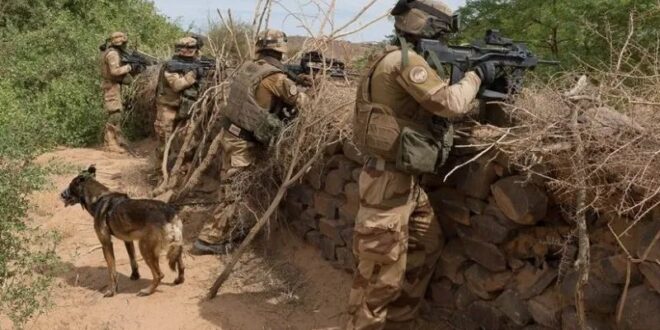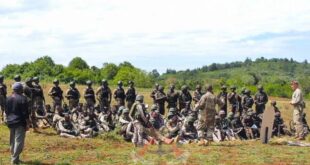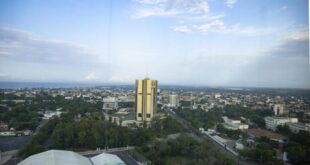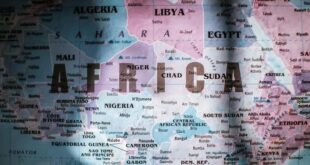In many ways, the Sahel today is at the forefront of major natural experiments to determine how mankind will adapt to climate change, technological innovation, global population movement and the restructuring of world politics, urbanization, social change and rapid population growth, as well as inter-religious contact.
What is the Sahel?
The sub-Saharan belt, known as the Sahel (“shore” in Arabic), has been characterized for centuries by an erratic climate, linked to irregular rainfall. Here, coexistence between herders and farmers has always been necessary, but it is also a source of conflict over resources.
The Sahel is a region with more than 100 million inhabitants from west to east and which is home to approximately 10% of the population of sub-Saharan Africa. This region of Africa is a vast area stretching from northern Senegal to northern Ethiopia. It includes a large number of states, including Mauritania, Mali, Burkina Faso, southern Algeria, Niger, northern Nigeria, Cameroon, Central African Republic, Chad, Sudan, South -Sudan and Eritrea. While the global average birth rate is 2.4, it reaches 5.4 in this region, which has the highest population growth rate on the continent. The inhabitants of this region, where only less than a third of the population lives in the cities and the majority in the countryside, exhibit all the characteristics of a semi-nomadic culture. With climatic conditions being sunny, dry and generally windy throughout the year, people in the region live in particularly difficult conditions, with drought and food security being the main problems.
The Sahel is one of the regions where relations are intertwined, where even the states concerned cannot establish full sovereignty in the countryside and where human mobility is highest due to difficult border control. In this region it is not easy to establish control, order or sovereignty in the Western sense. States can only expand their spheres of influence through implicit agreements with tribal leaders and community leaders. In this sense, the year 2011 is a very important breaking point.
In recent years, however, clashes have turned into massacres, partly due to the interweaving of territorial issues with the new jihadism. Several massacres have bloodied Dogon villages in Mali and the Sahel region of Burkina Faso, displacing tens of thousands of people.
In 2009, a Boeing 727 landed in the middle of the desert, on a makeshift airstrip: a concrete mound in the middle of nowhere. The plane, named Air Cocaïne, was carrying several tons of cocaine bound for Europe. What’s happening in the Sahel is therefore of great concern to everyone, as this region has become one of the main hubs of international politics, particularly underground politics. Various interests are converging on the Sahel, involving major European powers such as France, China’s new expansionist plans in Africa, Russia with Wagner mercenaries, the hegemonic aims of the most radical jihadist factions, the international drugs and arms market, and the lucrative trafficking of new slaves to Europe.
On the presence of Wagner combatants in Africa, William Rampe write in Council on Foreign Relations:
“Russia’s Wagner Group has intervened in the affairs of several African countries, providing military and security support while expanding Moscow’s influence across the continent.
The Wagner Group, a thousands-strong private military force, has in recent years become one of Russia’s most influential foreign policy tools. It has played a significant role on the battlefields of Syria and Ukraine and, recently, has worked to expand its footprint in Africa. The group has operated in several African countries since 2017, often providing its clients with direct military support and related security services alongside propaganda efforts.”
France caught in the Sahel quagmire
At the beginning of the 20th century, eighty French soldiers accompanied by six hundred riflemen invaded two powerful towns in the Sahara and Sahel. France, like many other European countries, saw African territories as areas to be appropriated. It took the place of existing governments by force, in the name of civilizational superiority based on racism.
Recent France’s military intervention in the Sahel has turned into a fiasco. Launched in January 2013, Operation Serval initially looked like a success story. The few hundred jihadists who had taken control of the main towns in northern Mali were routed. Jubilant crowds, waving French and Malian flags together, gave François Hollande a triumphant welcome when he visited Bamako.
But it was all a mirage. Within months, Operation Barkhane, which took over from Serval in July 2014, was bogged down. Jihadists regained ground in Mali and spread throughout the Sahel: local groups, linked to al-Qaeda or the Islamic State, formed and recruited widely, taking advantage of injustice and misery to pose as an alternative to failed states. Over the years, the region has sunk into political and security chaos, with civilians dying in their thousands and military coups multiplying. Powerless, France was increasingly criticized in its “pré-carré“.
The French army, steeped in colonial ideology and bogged down in obsolete “war on terror” schemes, is incapable of properly analyzing the situation. Caught in a vice between French decision-makers who didn’t want to lose face and African leaders who shirked their responsibilities, it multiplied errors and exactions. Civilians are killed. Informers are abandoned to the vengeance of jihadists. Anti-French demonstrations are violently repressed.
Under the guise of fighting “barbarism”, France has reneged on the principles it claims to defend on the international stage. Emmanuel Macron’s announcement of the redeployment of France’s military presence in the Sahel region does nothing to change this: France is pursuing a war in West Africa that does not bear its name, and on which the French have never had a say.
Troubled period
The Sahel and Sahara are currently going through a very troubled period, affected by the civil war in Libya, the conflict in Northern Mali and the revolt of the Boko Haram sect in the Lake Chad basin. These three poles of the “arc of crises” are disturbing at international, national and local levels, where “intercommunity” rivalries are grafted onto Islamist insurgencies and fuel them.
The breakthrough of Algerian jihadist movements in Mali is ominous, as is Algeria’s influence, which has taken precedence over that of Libya, which has been very weakened in the Sahel since the fall of Colonel Gaddafi. As for the policy of France, the main foreign power involved, one must look at it in terms of diplomatic relations, military strategy and the promotion of development to combat Islamism and restore peace.
In spite of these conflicts, there is hope in the resilience of the populations, manifested in their willingness and ability to exchange, to move and to engage in new activities. Observers must consider trans-Saharan trade (official, fraudulent, mafia-style), migration to the Old Continent, which the European Union wants to curb, and gold panning in desert areas, which can be both a “ferment of crises” through the covetousness it arouses (Chad), and a mitigating factor through the income it provides (Niger).
For Xl Iraki, writing in The Standard, Sahel people are losing hope in their institutions and the army is their only final resort for some sort of hope:
‘’After 60 years, the West African States and their institutions have hollowed out. That’s why the coups are taking place. The military is seen as the only institution that can be trusted and make a difference.
The climatic change and population growth have added pressure for a quick solution to countries’ economic problems. The countries going through coups rank highly on the poverty scale. Think of a country that is all like our arid and semi-arid areas.
Poverty creates political instability. Ever heard of communal violence in Runda, Muthaiga or Karen? The turmoil in West Africa has economic roots. But politics and too much control stifled economic growth.
There is another catalyst for political turmoil. The new Cold War.’’
And goes on to say:
”It is an unintended consequence of the Ukraine war. Russia is using Ukraine to recover and project power that was lost after the old Soviet Union collapsed in 1991. She is using a model beloved by modern capitalists, outsourcing. The Wagner group seems like the private wing of the Russian military, able to reach out where it’s needed and when needed. The newest destination is West Africa, the Sahel.
A drowning man will clutch to a straw. The hollow nations of West Africa will clutch to any helper, including the Wagner group. They are battling Islamic rebels emboldened by their hollowness. The site of Nigeriens waving the Russian flag on the streets after the coup was not a comedy.”
What next?
The fragile legitimacy of governments and institutions, the growing weight of criminal organizations dedicated to illicit trafficking, the insecurity generated by jihadist insurgencies, the social impact of human mobility phenomena, the vulnerability of systems exposed to extreme climatic variability: these are the main factors that make the Sahel – the strip of African territory on the southern edge of the Sahara – a highly critical geopolitical zone. A scenario made even more complex by the presence of numerous external players, driven by vested interests and logics of strategic competition.
Long on the bangs of researchers and politicians’ concerns, the countries of the West African Sahel have recently attracted worldwide attention, mainly as a key battleground in the “war on terror”. The region is a weathervane on the front line of the forces of global change.
For Climate Diplomacy organization, the climate is definitely a force of change in the Sahel:
“The Central Sahel region – Niger, Mali and Burkina Faso – will face significant climatic variations in the coming decades. Different models give different projections but the general consensus is that temperatures will rise 1.5 times faster than the global average between now and 2030, rainfall will vary more in time and space and extreme events will increase, with droughts and heavy rains, for example, potentially becoming more frequent and severe. This would disrupt agricultural and pastoral production – the area’s main economic activities – and harm vulnerable rural communities, especially women and historically excluded groups.
The effects of climate change on rainfall and transhumance patternscould also affect increasingly evident intercommunal tensions. Conflicts could worsen if systems of prevention, management and resource redistribution fail. Economic losses caused by climate and food insecurity, community tensions and the discrediting of institutions could indirectly benefit armed groups by facilitating recruitment among excluded communities. However, the researchindicates that climate change is unlikely to directly cause the proliferation of armed groups in thearea. “Other factors such as foreign military interventions, religious tensions and the marginalisation of pastoralist communities are likely to be more important”, according to Oriol Puig, a CIDOB researcher working on the CASCADES project.
Mobility is an important strategy for economic diversification in the Sahel. Climate change could lead to more forced displacement, increase migration from the countryside to the city and even intensify regional migration. However, migration to other African countries would far exceed that to Europe. Certain populations would also be trapped because they lack the means with which to move. “
Beyond this immediate news, two reasons are today sources of great concern for the future. First, the decline of democracy in the Sahel: after Mali, Burkina Faso and Guinea Conakry, Niger is the fourth country, in three years, to see its elected civilian president driven from power. Then, the progression of hostile sentiment towards France – more, it seems, than strictly speaking anti-French – in Africa is very serious.
It has multiple causes, which relate to the colonial past, to some of our military interventions, to the sometimes-careless support for local political leaders who are not always beyond reproach… It is important to find ways to enhance the image of France in this region, at a time when Africa is precisely at the heart of a merciless battle between great powers seeking to extend their influence there. France has arguments to put forward and reasons to want to work towards the balance of this continent which will be home to some two billion inhabitants by 2050.
Added to the situation in Niger is that of Gabon, since the result of August 27, 2023 elections – having designated the outgoing president Ali Bongo – sparked strong protests. Right after, the military carried out a coup d’état, bringing to power General Brice Oligui Nguema, head of the Republican Guard. The situation remains uncertain at this time. But Gabon is, in this way, added to the list of military states…
In this regard Peter Beaumont writes in The Guardian:
‘’Military officers in Gabon say they have taken power and put the president, Ali Bongo Ondimba, under house arrest, as the country becomes the latest in Africa to suffer an attempted coup, only weeks after mutinous troops seized power in Niger.
A group of military personnel appeared on state television to announce they were seizing power to overturn the results of a presidential election, seeking to remove a president whose family has held power for nearly 56 years. The officers introduced themselves as members of the Committee of Transition and the Restoration of Institutions.
If successful, the coup would be the eighth in west and central Africa since 2020. The most recent one, in Niger, was in July, while the military has also seized power in Mali, Guinea, Burkina Faso and Chad.
In a video apparently from detention in his residence, Bongo Ondimba called on people to “make noise” to support him.
Crowds instead took to the streets of the capital and sang the national anthem to celebrate the coup attempt against a dynasty accused of getting rich on the country’s resource wealth while many of its citizens struggle to scrape by.’’
 Eurasia Press & News
Eurasia Press & News



